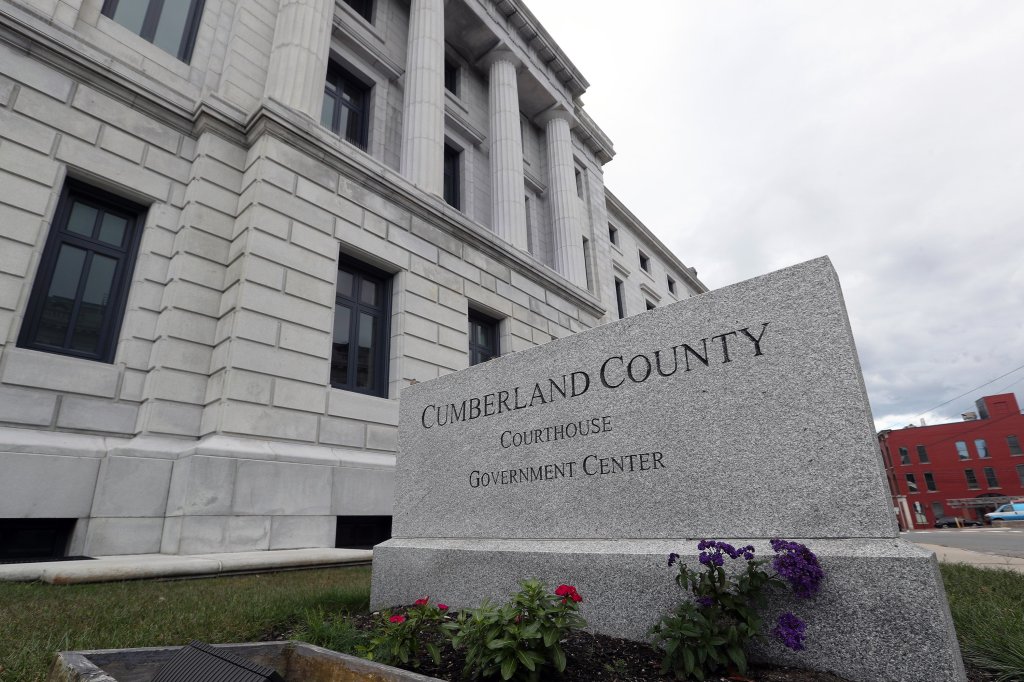On a gray morning last week, former state Sen. Bill Diamond stood at a rally in front of the State House and implored Maine’s government to do more to prevent child abuse – and be transparent about its efforts.
A nearby sign attached to a stone column listed the names of eight Maine children on blue sneakers: eight children who have died in the past three decades, and whose names have become synonymous with the state’s child welfare system, including Maddox Williams, Marissa Kennedy and Logan Marr.
Diamond was describing a horrific addition to that list. Ten-year-old Braxtyn Smith died at a Bangor hospital in February. Police said the boy’s death followed months of physical abuse by his mother, father and grandmother, who have all been charged with depraved indifference murder.
Diamond wanted to know if Maine’s Department of Health and Human Services, which oversees the state’s child protective system, had ever made contact with the boy, who was homeschooled, or his family. The department has refused to say, citing confidentiality laws.
“There are good reasons for confidentiality,” Diamond said. “But in terms of transparency, it’s appeared over the years that they’ve used that as a reason not to talk at all. I think there are openings there where they could talk and they could help the situation.”
Others at the rally agreed. A social worker called for the department to stop “operating behind closed doors.” A school superintendent implored the state to “open up the system so we know what we’re working with.” A foster mom said it is “crucial for the Iron Curtain to be pulled back so we can get the transparency needed to reform policies that continue to fail our children.”
But the speeches were light on policy specifics, and what the transparency they envision looks like in practice is somewhat nebulous.
All child welfare systems face a tension between protecting the confidentiality of vulnerable parents and children, and the need to inform the public about how the system operates, particularly in high-profile cases of abuse or neglect.
The debate over how to balance those two interests is an old one, but critics in Maine and elsewhere have argued that more transparency is needed to ensure that confidentiality rules are protecting children and their families, not shielding child welfare agencies from public scrutiny.
Like many such agencies across the country, Maine’s beleaguered office suffers from high staff vacancies and turnover, leaving its caseworkers overburdened. Efforts in the Legislature this year to create a standalone child welfare office failed, as the debate continues about how to address concerns that the system is not adequately protecting children.
Maine’s rate of child maltreatment is more than double the national average and the fourth-highest in the country, according to the most recent federal data. Homicides and deaths of children involved with the child welfare system rose from seven in 2007, when the state began tracking this, to a high of 34 in 2021, before declining to 23 last year.
At the same time, Maine is one of just a handful of states that increased the rate of removing children from their families between 2018 and 2022.
The public knows almost nothing about most of these cases – often only hearing about them if there is a death and the case enters the criminal justice system.
The department says it is bound by federal confidentiality rules and would lose funding if it violated them. Advocates like Diamond say the department’s interpretation of the rules is overly broad and self-serving.
Lawmakers tasked with oversight bemoan the department’s power as they face off with the attorney general’s office over access to department records.
Meanwhile, state law keeps child protection court proceedings – and the department’s contested actions – out of public view.
“State and federal confidentiality laws prohibit the department from commenting on child protective matters in most instances, subject to very limited statutory exceptions,” said DHHS spokesperson Lindsay Hammes.
Federal rules attach confidentiality requirements to funding for state child welfare agencies to make sure victims of abuse aren’t hurt by details of their case being made public, said Brian Blalock, senior directing attorney with the nonprofit Youth Law Center.
But over the last two decades, those federal rules have been loosened to give states more leeway to provide information to the public, especially around child deaths, Blalock said.
“There’s a real legitimate tension between the harm not preserving confidentiality can cause these families and communities, and the harm if there’s not enough transparency and accountability,” Blalock said. “I think it’s a huge issue, but it gets so complicated so quickly.”
CONFIDENTIAL RECORDS
The complications are illustrated by a case currently before the Maine Supreme Judicial Court. It involves DHHS’s refusal to respond to a subpoena from the Legislature’s government oversight committee demanding case files related to four children who died in 2021.
DHHS supplied the records to the Office of Program Evaluation and Government Accountability (OPEGA), the independent office that performs investigations on behalf of the Government Oversight Committee. But the department refused to turn the records over to the committee.
Representing the department, the attorney general’s office argued doing so would violate federal law and risk “losing funding critical to the administration of its Maine Child Welfare Services program.”
A district court ruled in favor of DHHS, but Maine’s top court took up the case on appeal. It heard oral arguments in December and has yet to issue a ruling.
Both sides have argued that the federal laws in question vindicate their position.
The Child Abuse Prevention and Treatment Act strikes a balance between “the families’ right to privacy, and the right of children to be free from abuse and neglect,” the attorney general’s office said. The state is only allowed to share records with government entities that need the information to “protect children from child abuse and neglect.”
The attorney general’s office said OPEGA is one such entity, because it would use the information to suggest improvements to the child welfare system. The committee, it argued, is too removed from protecting children to have a legitimate need for the records.
Attorneys representing the committee contended that federal laws don’t say the records can’t be shared, only that the state needs to have a system to ensure confidentiality outside “legitimate state purposes.” They argued the committee has a “legitimate state purpose” in seeing the records to “examine the efficacy of services provided by the department.”
The conflict over the records may stem in part from the federal government’s lack of clarity around its disclosure laws. Researchers at the Children’s Advocacy Institute at the University of San Diego School of Law criticized the Administration for Children and Families for not instituting “formal, binding regulatory instructions” around disclosure.
“States are struggling to understand exactly what their responsibilities are with regard to the public disclosure mandate,” researchers wrote in 2015. An institute spokesperson said she was not aware of federal action to provide greater clarification in the intervening years.
Sen. Jeff Timberlake, R-Androscoggin, sits on the government oversight committee. It’s the committee’s job to oversee the department, which requires being able to see those records, Timberlake said. He claimed refusing to turn them over wasn’t about protecting kids, but “protecting DHHS and its employees.”
Both Timberlake and the committee chair, Sen. Craig Hickman, D-Kennebec, introduced bills last year that would have clarified the committee’s ability to access confidential information. But both bills failed to gain traction after objections from Gov. Janet Mills’ administration.
Timberlake also introduced a bill last session to separate the Office of Child and Family Services from the rest of DHHS, and make it a standalone department. The bill passed the Senate but was never picked up by the House. It mirrored legislation Diamond put forward while a legislator in 2021.
Timberlake’s bill was “designed to make Office of Child and Family Services much more visible and much more transparent,” he said. The office is insulated from public view by layers of bureaucracy inside the Department of Health and Human Services, Maine’s largest state agency.
“Part of what I was trying to do,” Timberlake told The Maine Monitor, “was be able to dig down through and peel the layers of the onion back.”
CLOSED COURTS
While records are generally confidential, a number of states have opened child welfare court proceedings, meaning observers – including journalists and policymakers – can observe the system in action. In Maine, cases are closed to the public.
When a Monitor reporter asked a Portland court clerk not if he could attend one of the cases, but simply when and where they took place, he was told even that information was secret.
Seventeen states have open child welfare proceedings, but judges can close them at their discretion. Another two states have fully open systems, according to a 2011 analysis of state laws by the National Center for Juvenile Justice.
That same analysis found that 31 states – including Maine – have closed proceedings but allow judges to open individual cases.
Vivek Sankaran, director of the Child Advocacy Law Clinic at the University of Michigan, often wonders who closed courts are protecting.
“Are they protecting the agency and the courts, and the inside players?” he asked. “I think there’s certainly a lot of that going on. For me, the need for transparency outweighs everything.”
The closed court system means the only cases that become public are those that enter the criminal justice system, typically because of child deaths. Those cases, which are horrific and outliers, are often the only glimpse the public and legislators get into a system that handles more than 26,000 referrals a year.
Physical abuse allegations make up less than a quarter of child protective cases in Maine each year, while most are related to neglect or lack of housing. Advocates say this distorts reality because stories of failures on the other end of the spectrum, in which children are removed and families torn apart unnecessarily, never become public.
“Secrecy is behind a lot of unnecessary removals because they can’t be observed in the moment and can’t be talked about afterwards,” said Matthew Fraidin, a professor at the University of the District of Columbia School of Law who has written about confidentiality in the child welfare system. “So everything is driven by one horrible death. It’s horrible but it’s not the real story of child welfare.”
He said “secret courts and secret decisions” are an “invitation to bias.”
The closed-off nature of this system also presents difficulties for lawyers representing parents, said Taylor Kilgore, an attorney based in Turner. They can’t see the arguments other lawyers have made unless a case goes to the Maine Judicial Supreme Court and the court publishes a decision (the court uses pseudonyms in their published decisions to protect the identities of those involved).
“If somebody has made the exact same argument I’m making, and they failed on it, I don’t really have a way to know that,” Kilgore said.
In addition, the Maine supreme court is increasingly publishing memorandums instead of full decisions, Kilgore said. While full decisions are many pages long and discuss the legal issues involved, memorandums of decision can be as short as a few sentences and typically say little more than how the court ruled.
“There really isn’t a lot of information there for any of us to go on,” Kilgore explained.
Fraidin said this lack of transparency can equate to a lack of accountability.
“Secrecy also means there’s no real incentive for the state to improve its functioning because they don’t have an incentive to learn from their mistakes and ups and downs,” he said. “Because nobody’s watching.”
This story was originally published by The Maine Monitor, a nonprofit and nonpartisan news organization. To get regular coverage from the Monitor, sign up for a free Monitor newsletter here.
« Previous
Related Stories































Invalid username/password.
Please check your email to confirm and complete your registration.
Use the form below to reset your password. When you’ve submitted your account email, we will send an email with a reset code.